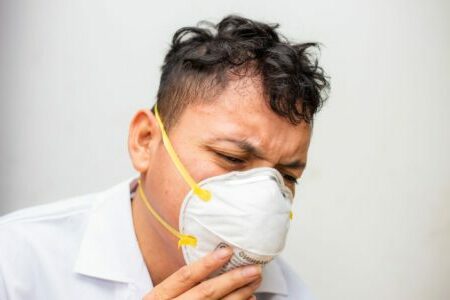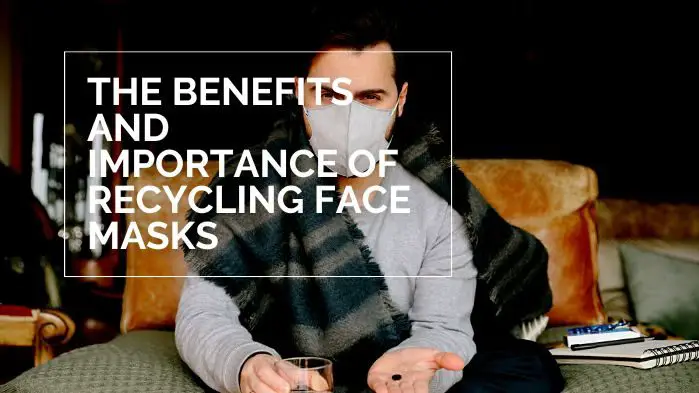Face masks can be recycled. However, following the guidelines set by your local recycling facility is essential, as they may have specific rules for recycling face masks properly. For example, some facilities may require you to place face masks in a separate bag or container before placing them in the recycling bin.
It is also important to note that face masks should be appropriately disposed of after use, as they can potentially harbor bacteria or viruses. It is generally recommended to dispose of single-use face masks in a waste bin and to wash reusable face masks after each use.
The Importance of Recycling Face Masks
Recycling face masks are essential for several reasons. First and foremost, it helps to reduce waste and prevent unnecessary pollution.
Disposable face masks are made from various materials, including plastic, which can take hundreds of years to break down in the environment. By recycling these masks, we can keep them out of landfills and prevent them from contributing to plastic pollution.
In addition to reducing waste, recycling face masks can also help to conserve natural resources. Disposable face masks require raw materials such as oil, water, and energy. By recycling these masks, we can reduce the demand for these resources and minimize the environmental impact of face mask production.
Recycling face masks can also have economic benefits. Recycling facilities can process used face masks and turn them into new products, creating jobs and supporting local economies.
Finally, recycling face masks can help to reduce the demand for new face masks, which can help to lower prices and make them more accessible to those in need.

How to Properly Dispose of Used Face Masks
It is essential to properly dispose of used face masks to prevent the spread of bacteria or viruses and to reduce the risk of contamination. Here are some guidelines for disposing of face masks:
- If you are using a disposable face mask, remove it from the ear loops and carefully tie the ear loops together to avoid touching the front of the mask.
- Place the used face mask in a designated waste bin. Please do not throw it on the ground or leave it lying around.
- Wash your hands thoroughly with soap and water after disposing of the face mask.
- If you use a reusable face mask, wash it after each use according to the manufacturer’s instructions. This typically involves washing it in hot water with detergent and allowing it to air dry.
- Do not reuse disposable face masks. They are designed for single use only and should be disposed of after each use.
By following these guidelines, you can help to prevent the spread of bacteria or viruses and keep your environment clean and safe.
The Environmental Impact of Face Mask Waste
The environmental impact of face mask waste is a growing concern as the use of face masks has become more widespread in recent years. Disposable face masks are made from various materials, including plastic, which can take hundreds of years to break down in the environment. When disposable face masks are not correctly disposed of, they can end up in landfills, contributing to plastic pollution and waste.
In addition to the environmental impact of face mask waste, there is also the issue of resource depletion. Disposable face masks require raw materials such as oil, water, and energy. This can lead to these resources’ depletion and environmental degradation.
To mitigate the environmental impact of face mask waste, it is essential to recycle face masks whenever possible and to dispose of used face masks in designated waste bins properly. By taking these steps, we can help to reduce waste and conserve natural resources.
The Benefits of Reusable Face Masks
Reusable face masks have several benefits compared to disposable face masks. Some of the main benefits include:
- Sustainability: Reusable face masks can be used multiple times, which reduces the need for disposable masks and the associated waste. This can help to reduce the environmental impact of face mask production and disposal.
- Cost-effectiveness: Reusable face masks can be more cost-effective in the long run compared to disposable masks, as they do not need to be replaced as frequently.
- Comfort: Some reusable face masks are made from softer, more breathable materials, which can be more comfortable to wear for extended periods.
- Customization: Reusable face masks can often be customized with different patterns and designs, allowing individuals to express their style.
- Functionality: Reusable face masks may have additional features, such as filters, which can improve their effectiveness in blocking respiratory droplets.
Individuals can contribute to a more sustainable and cost-effective solution to face mask use by choosing reusable face masks.
Can You Throw Away Face Masks?
You can throw away face masks, but it is essential to do so responsibly. Disposable face masks should be placed in a designated waste bin after use to prevent the spread of bacteria or viruses and to reduce the risk of contamination. It is generally not recommended to throw away face masks in public places or on the ground, as this can contribute to litter and may pose a risk to public health.
It is also important to note that face masks should be appropriately disposed of after use, as they can potentially harbor bacteria or viruses. It is generally recommended to dispose of single-use face masks in a waste bin and to wash reusable face masks after each use.
By following these guidelines, you can help to prevent the spread of bacteria or viruses and keep your environment clean and safe.
Conclusion
Recycling face masks are essential for several reasons. It helps to reduce waste and prevent unnecessary pollution, conserve natural resources, support local economies, and lower the cost of face masks.
Properly disposing of used face masks is also essential to prevent the spread of bacteria or viruses and to reduce the risk of contamination. Reusable face masks offer a more sustainable and cost-effective alternative to disposable face masks and may have additional benefits such as comfort and customization. By following these guidelines, individuals can contribute to a more sustainable and safe solution to face mask use.

